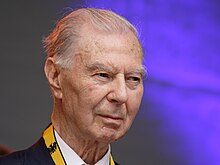Leo Tindemans
| Leo Tindemans | |
|---|---|
 |
|
| 43rd Prime Minister of Belgium | |
|
In office 25 April 1974 – 20 October 1978 |
|
| Monarch | Baudouin |
| Preceded by | Edmond Leburton |
| Succeeded by | Paul Vanden Boeynants |
| Minister of Foreign Affairs | |
|
In office 17 December 1981 – 19 June 1989 |
|
| Prime Minister | Wilfried Martens |
| Preceded by | Charles-Ferdinand Nothomb |
| Succeeded by | Mark Eyskens |
| President of the European People's Party | |
|
In office 8 July 1976 – 1985 |
|
| Preceded by | Position established |
| Succeeded by | Piet Bukman |
| Personal details | |
| Born |
Leonard Clemence Tindemans 16 April 1922 Zwijndrecht, Belgium |
| Died | 26 December 2014 (aged 92) Edegem, Belgium |
| Political party | CD&V |
| Spouse(s) | Rosa Naesens |
| Children | Thomas Pia Nora Bruno |
| Alma mater |
University of Antwerp Ghent University Catholic University of Leuven |
| Religion | Roman Catholicism |
Leonard Clemence "Leo" Tindemans (Dutch: [ˈleːjoː ˈtɪndəmɑns]; 16 April 1922 – 26 December 2014) was a Belgian politician. He served as the 43rd Prime Minister of Belgium serving from 25 April 1974 until he resigned as minister on 20 October 1978. He was a member of the Christian Democratic and Flemish party.
Tindemans was born in Zwijndrecht, Belgium, to a Catholic family.
Tindemans was affiliated with the CVP. At the time, the party was strong in the northern region of Flanders. Tindemans was elected to the Belgian Chamber of Representatives in 1961 and re-elected in 1965, 1968, 1971, 1974, 1977 and 1978. From 1965 to 1973 Tindemans also served as the mayor of Edegem.
In 1968 Tindemans became minister tasked with the relations between the communities (1968–1972) during which he prepared the first constitutional reform which saw Belgium start transforming into a federal state. In 1972 he became minister for agriculture (1972–1973). In 1973 he became deputy Prime Minister and minister for the budget (1973–1974).
Tindemans served as Prime Minister of two Belgian governments, from 25 April 1974 to 20 October 1978. His first cabinet was a minority government formed by the Christian-democrats and liberals. When his first government fell in 1977, Tindemans won the snap general election with 983,000 votes, still a record for any election in Belgium. This formed his second cabinet with the Christian-democrats, socialists and Flemish nationalists. His second government (1977–1978) fell due to the controversy surrounding the Egmont pact.
He was awarded the Charlemagne Prize 1976.
At the conclusion of the Paris Summit in 1974, Tindemans was tasked with devising a report to define what was meant by the term ‘European Union.’ Consulting not only reports drawn up by the European Parliament, European Commission and the European Court of Justice, Tindemans also sought advice from members of European governments and “other powerful forces in the various States.” Tindemans deliberately sought to avoid using the term constitution, and instead referred to his proposals as “a new phase in the history of the unification of Europe which can only be achieved by a continuous process.” Four major areas were outlined in the report: European foreign policy, European economic and social policies, European citizen rights, and the strengthening of existing European institutions.
...
Wikipedia
